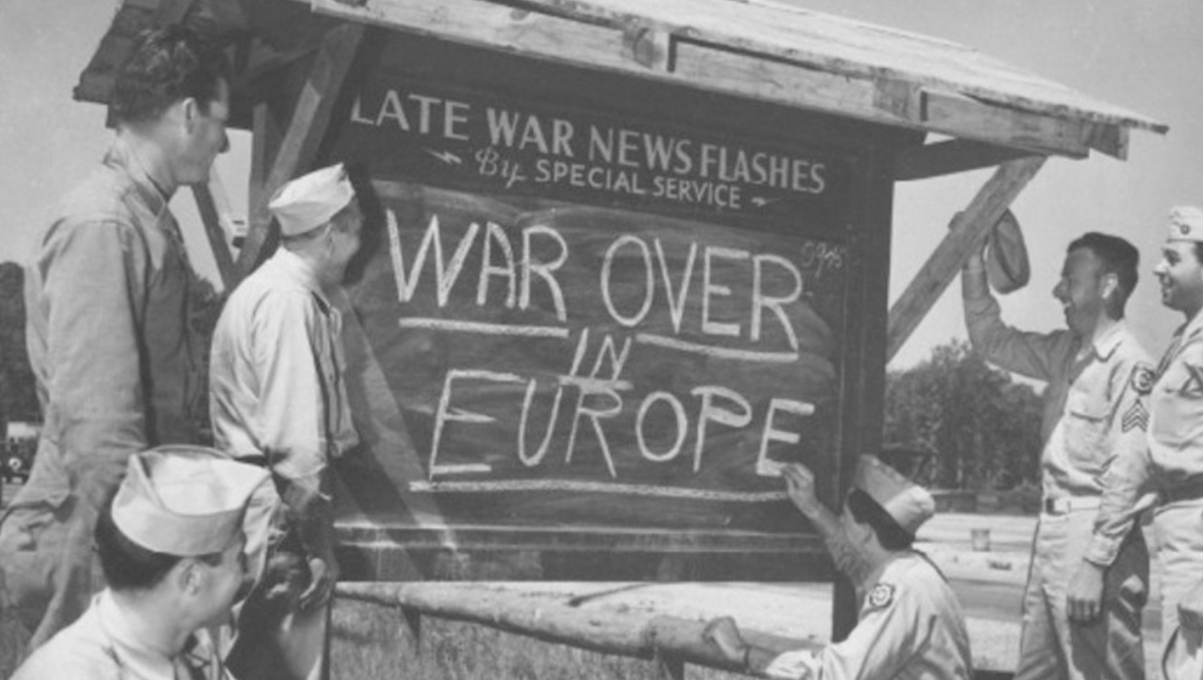
When we think about victory in Europe, and seriously try to consider what the end of the war could or should have meant, we must think about what kind of world was going to come next.
May brings celebrations of the end of the Second World War in Europe. In the West on 8 May, official celebrations are quite muted, while the media and private individuals (especially know-it-all historians) mark the day in their own ways. In Moscow on 9 May, the Russian state hosts a massive Victory Day military parade that rivals even the old Soviet May Day celebrations. The differences in date and tone exemplify different understandings of the Second World War, but they share the common sentiment of wanting to remember the sacrifices required to defeat Nazism while also using the commemoration to provide further justification for that participant’s behavior in the present and role in the future.
Of course, it is proper to commemorate the end of the European portion of the most destructive war in human history and the destruction of the genocidal Nazi regime. To do that, however, we should not simply look back at the victory but look forward to what comes next. As it happens, there are events that also happened on 8 and 9 May that offer just that sort of window onto a hopeful future.
When we think about victory in Europe, and seriously try to consider what the end of the war could or should have meant, we must think about what kind of world was going to come next. If the purpose of World War II, or any war, is to create a better peace, that means not just a peace better and more hopeful than the uniquely terrible time of fighting but also a peace better than the very messed up world of the decades that led to the war in the first place. In other words, we should celebrate not just the end of the war, but the start of a new and better world.
The Framework for a New Germany
The first event was 8 May 1949, when representatives from the American, British, and French occupation zones in Germany announced the completion of a basic law (Grundgesetz) for a new Federal Republic of Germany. Negotiated by a parliamentary council of politicians, constitutional scholars, and other community leaders in the university town of Bonn, this document aimed to provide a democratic framework for a new German state. Beginning with the statement that “Human dignity shall be inviolable,” the Basic Law’s 146 original articles sketched out the most democratic government in German history, offering protections both to individual freedoms and regional autonomy.
The decision to move forward with the project of uniting the three Western occupation zones was the result of complex negotiations between the Western allies (Britain, France, and the United States) and local German leadership. It was not taken lightly and occurred alongside the decisions to integrate those zones within the Marshall Plan and to establish a new currency, the Deutschmark, all in the shadow of the Soviet blockade of Berlin and the Allied decision to provide supplies through an airlift. The Western allies wanted both to stabilize as much of Germany as they could within a divided Europe, while also demonstrating a commitment to eventual German rehabilitation and reunification, even as the Germans wanted to demonstrate their commitment to democratic rebirth, but no one at the time knew exactly how things were going to turn out.
As a result, the document was hedged around with provisions. Called a basic law rather than constitution, its framers understood that they were representatives of only part of Germany. The Soviet occupation zone did not send any delegates, nor were smaller territories included such as the Saar, which was still internationalized at this point, let alone those parts of Germany that had been provisionally assigned to Poland and the Soviet Union. Nonetheless, this fragment of Germany aimed to offer hope for the future by laying out the rules for a federal republic that would overcome the centralization and militarization of previous Germanies that had wrought so much horror upon Europe and the world.
It was fitting that a provisional constitution was proclaimed in a provisional capital. Bonn had been known as the birthplace of Beethoven and for little else but was evacuated by the allies and became the temporary seat of the new government. When the Soviet occupation zone declared itself to be the German Democratic Republic in October 1949, there were now two German states, each of whom claimed to be the core of the real Germany.
This provisional organization lasted for more than forty years, to the point that a lot of people both inside and outside of Germany began to assume that the existence of two states was a permanent answer to the German question. But that was not the original intention. The framers of the Basic Law announced in the preamble that their council, “by virtue of its constituent power, enacted this Basic Law of the Federal Republic of Germany to give a new order to political life for a transitional period” but also “acted also on behalf of those Germans to whom participation was denied.” Most importantly, they also declared: “The entire German people is called upon to accomplish, by free self-determination, the unity and freedom of Germany.”
The adoption of a constitution may not seem as dramatic as the surrender of a diabolical enemy.
In 1989, this aspiration was suddenly a possibility thanks to the fall of the Berlin Wall and the collapse of the GDR under the stampeding feet of its citizens fleeting to the West. The ensuing discussion about whether the Germans needed to write a new constitution was won by Chancellor Helmut Kohl, who argued that the Basic Law had created a successful, democratic political order that could be extended to the former East Germany. The capital returned to Berlin, but the organizational structure of the Berlin Republic has remained largely as designed by the framers of the Basic Law in Bonn in 1949.
The adoption of a constitution may not seem as dramatic as the surrender of a diabolical enemy. Yet, comparing the 75 years since 1949 to the 75 years before 1949, and contrasting the peaceful, prosperous, and stable Federal Republic of Germany to the expansionist, imperialist, and genocidal Germanies that preceded it, highlights how transformative the Basic Law was for the creation of a democratic postwar order. Drafting the Basic Law helped win the peace by creating a Germany that was open to cooperation with his neighbors, especially its former archenemy, France, to build a more peaceful and prosperous Europe.
The Framework for a New Europe
Speaking of Franco-German relations leads us to the second May holiday that deserves closer attention on this side of the Atlantic, one marking the launch of a new Europe. On 9 May 1950, French Foreign minister Robert Schuman announced a plan to overcome western European political and economic differences by encouraging the Germans and French and other European nations to link their coal and steel industries within one large supranational community. The European Coal and Steel Community eventually included six states—France, West Germany, Italy, Belgium, the Netherlands, and Luxemburg—and was the most important first step in the development of the European Union.
Schuman’s motivation was both practical and idealistic. Practically, he and his colleagues in Paris wanted to figure out how the French economy could recover from the war, and how the German economy could be harnessed for European recovery without rekindling German militarism. Idealistically, as a Christian Democratic politician from Alsace who spoke both German and French, Schuman believed that European integration was the best way to overcome the Franco-German rivalry that had inflicted so much destruction on the peoples of Europe and the world. Guided by a vision of a common European civilization, he worked enthusiastically with colleagues such as Konrad Adenauer, who had been the president of the parliamentary council that wrote the Basic Law and became the first chancellor of the Federal Republic of Germany. Schuman was explicit in his hopes when he declared, “by pooling basic production and by instituting a new high authority, whose decisions will bind France, Germany and other member countries, this proposal will lead to the realization of the first concrete foundation of a European federation indispensable to the preservation of peace.”
The European Union is far from perfect, but we should not allow a focus on its current bureaucratic malaise or political weakness to blind us to the profound significance of European integration to the stability of the postwar world. Again, comparing the 74 years since 1950 to the 74 that preceded it should remind us how much blood and treasure was lost in the struggle between France and Germany, and how much more peaceful and prosperous Europe has become once that enmity has been transformed into cooperation within a European framework. Even as Europe today faces a new war in Ukraine, the states of the EU are working together to preserve and extend the institutions that have brought better lives to so many.
Commemorating a Better Peace
Defeating Nazi Germany was a triumph for humanity. But that military victory would have been hollow and transitory if the Europeans (with American support and encouragement) had not been able to build a better peace after unconditional surrender. Then as now, victory is never simply a matter of defeating a military foe. Victory in Europe did indeed come on 8 and 9 May, but it required the creation of a democratic Germany and the Schuman declaration signaling the birth of a new Germany within a new European order. Lasting victory is not simply the work of a day, but the result of long-term commitments to building and maintaining a postwar world. Lasting victory requires a vision for a better future, to inspire us to take up the work of those who came before. We should keep that in mind when we consider the meaning of these May Days.
Ron Granieri is Professor of History at the U.S. Army War College and the editor of A Better Peace: The War Room Podcast. He previously taught at the University of Pennsylvania as well as other universities in the United States and Germany, and is Templeton Fellow at the Foreign Policy Research Institute. He is the author of The Ambivalent Alliance: Konrad Adenauer, the CDU/CSU, and the West, 1949-1966 (2003), and is working on a book about German politics from the 1960s through unification as well as a history of the Atlantic Community.
The views expressed in this article are those of the author and do not necessarily reflect those of the U.S. Army War College, the U.S. Army, or the Department of Defense.
Photo Description: The United States joins other nations in celebrating V-E Day, the official surrender of Nazi Germany on May 8, 1945, marking the end of the war in Europe during World War II.
Photo Credit: Scott Duerbeck





As to a understanding of what — immediately after the Old Cold War — (a) we conceived of as a “better peace,” (b) what our opponents understood we conceived of as a “better peace and (c) what everyone else in the world understood, back then, was what we conceived of as a “better peace” — consider the following from the Old Cold War “surrender document”/the Old Cold War “peace treaty, to wit: “The Charter of Paris for a New Europe” — signed by most European governments in addition to those of Canada, the United States and the Soviet Union at the end of the Old Cold War:
“We undertake to build, consolidate and strengthen democracy as the only system of government of our nations.” (See Page 3.)
“Human rights and fundamental freedoms are the birthright of all human beings, are inalienable and are guaranteed by law. Their protection and promotion is the first responsibility of government. Respect for them is an essential safeguard against an overmighty State. Their observance and full exercise are the foundation of freedom, justice and peace.” (Also at Page 3.)
“Freedom and political pluralism are necessary elements in our common objective of developing market economies towards sustainable economic growth, prosperity, social justice, expanding employment and efficient use of economic resources.” (See Page 4.)
Question — as per the final paragraph of the article written by Ron Granieri above:
Is the problem here then that — post-the Old Cold War — we did not make a long-term commitment, to build and maintain the post-Cold War world — described in the “Charter of Paris for a New Europe” document above?
Addendum: Here is the second to last sentence in Dr. Granieri’s article above:
“Lasting victory is not simply the work of a day, but the result of long-term commitments to building and maintaining a postwar world.”
With regard to the “long-term commitment” — addressed Dr. Granieri above re-post World War II Europe — should we not also consider such things as (a) the Marshall Plan and (b) many American/allied personnel and their families’ numerous tours of duty (three in my career) in post-World War II Europe?
In comparison, and as relates now to my post-Cold War comments immediately above, there would seem to be no such — similar in any way, shape or form — extensive and long-term commitments?
As a potential reason for (a) our long-term commitment post-World War II and (b) our lack of a long-term commitment post-the Cold War, this being that:
a. Post-World War II, there still remained an existential threat that the U.S./the West had to deal with; whereas,
b. Post-the Cold War, there was no such — post-war — existential threat?